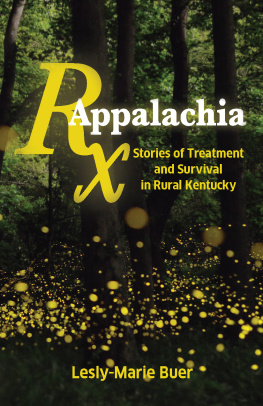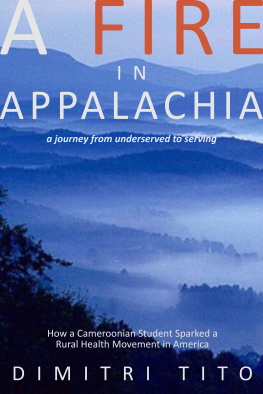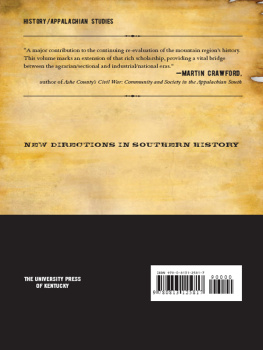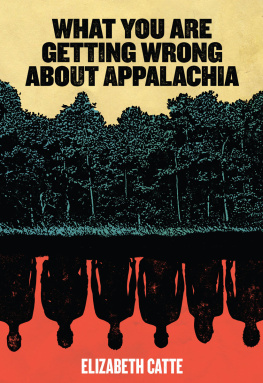
At once an intimate, accessible, and deeply analytical examination of gendered experiences of socially structured suffering, care work, and resistance, Buers ethnography is an important counter-narrative to the increasing stigmatization of pregnant and parenting women who use drugsand to the overall stigma surrounding Appalachia. In this book Buer skillfully interweaves a critical anthropological unveiling of the policy-driven constraints affecting the women whose lives and families are humanized in the pages, with their own accounts of how it affects them, and what they do about it. Refreshingly un-sensationalized, Rx Appalachia comes across as some of the most silenced and marginalized in a region finally telling their own story, with support from a narrator who clearly articulates their context.
Dr. Bayla Ostrach, author, Health Policy
in a Time of Crisis: Abortion, Austerity, and Access
Lesly-Marie Buers Rx Appalachia is a compelling account of substance abuse in Central Appalachia that at last puts race and gender at the forefront of analysis. Buer, a harm reductionist and medical anthropologist, offers a layered portrait of the lives led by women who use drugs and their experiences navigating treatment programs too often shaped by punitive impulses rather than evidence-based research. A rare book that combines a powerful systemic critique within humanely-rendered stories of coping and survival, Rx Appalachia is a clear and accessible primer about the people and places now synonymous with Americas new addiction crisis.
Elizabeth Catte, author of What You Are Getting Wrong
About Appalachia and Pure America
Lesly-Marie Buers ethnographic study Rx Appalachia examines what happens to women and mothers who use drugs and get caught up in the intertwined therapeutic, rehabilitative, and often punitive practices of public and private addiction recovery programs including drug courts. Buer analyzes the entangled dimensions of care and cruelty, domination and love, family and community, and the discursive and disciplinary techniques that are involved in so-called rehabilitation efforts. What good such programs might do is often undercut by inadequate funding and by their tendency to ignore or worsen the stereotypes and the structural and systemic inequalities, constraints, and violence their clients face on a daily basisoften within the programs themselves. The ethnographic site of this brilliant book is Appalachia but it is a must-read for scholars, practitioners, students, concerned citizens, and clients everywhere.
Dwight B. Billings, emeritus professor, University of Kentucky
Reproductive justice demands that we provide parents who use drugs with sufficient resources such as housing and access to comprehensive reproductive health care, knowing that parents well-being is intrinsically linked to that of their children. Dr. Buer makes a strong case for why tax dollars spent on policing and incarceration are harmful and no substitute for adequate social supports and basic human rights. This book makes the case for why we cant simply wait on the state to rectify the many injustices that plague the lives of people and especially women in Appalachiawe must take care of each other now.
Anna Carella, codirector, Healthy and Free Tennessee
In this riveting account, Buer defies the media version of the opioid crisis in Appalachia, a story of overnight villains and victims. She listens to the women who for years have navigated punitive and highly gendered and racialized state policies, deeply unequal social structures, and state divestment. She asks women who use drugswho have been told over and again how to fix themselves and to whose standardswhat they believe they need for themselves and their care networks of family and friends. Their refreshing narratives intertwine with Buers careful contextualization to produce a bold vision for harm reduction in Appalachia. A necessary book for those seeking to understand the opioid crisis and the broader political economy of which it is part.
Jessica Wilkerson, author, To Live Here, You Have to Fight:
How Women Led Appalachian Movements for Social Justice
In the midst of the latest drug scare focused on opioids, pregnant women have once again become the objects of state surveillance and control. Lesly-Marie Buers book arrives just in time to provide information needed to evaluate and challenge government responses that focus on separating families and fixing mothers rather than the economic, social, and public health policies that undermine womens health and lives. With moving accounts by mothers of their desperate efforts to do whatever it takes to get their children back and revelations of sometimes shocking state actionincluding compelled religious education and prohibitions on needed medical treatment, this beautifully written book is a must-read.
Lynn Paltrow, executive director, National Advocates for Pregnant Women
Anyone who does research or practice in rural communities affected by drug use will agree with my feeling that we have long needed this book. This deep ethnographic examination into the lives of women in Appalachia who use drugs serves as a vital antidote to shallow representations of rural drug use in the age of the opioid epidemic. Buer is comprehensive in her approach to understanding not only the histories and inequities that contribute to drug use, but also the ways that the design of public health and social systems to address these health disparities inadvertently can harm those who they are meant to serve. While this book helps us to understand the larger inequities that have led us to here, it also begins to help us understand the path to move forward.
Claire Snell-Rood, author, No One Will Let Her Live:
Womens Struggle for Well-Being in a Delhi Slum
Rx Appalachia offers a compelling examination of a region often mischaracterized as a place plagued by inherent violence and dysfuntion. Looking deeply into the lives, care networks, and treatment experiences of women who use drugs, Lesly-Marie Buer reveals the vigilance necessary to overcome the forces of structural violence, as women strive to instate their rights to dignity, healthcare, livelihood, and their childrens futures.
Kelly Ray Knight, author of addicted.pregnant.poor
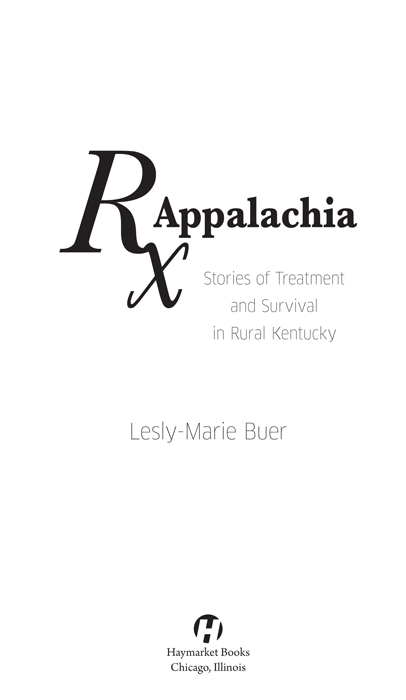
2020 Lesly-Marie Buer
Published in 2020 by
Haymarket Books
P.O. Box 180165
Chicago, IL 60618
773-583-7884
www.haymarketbooks.org
ISBN: 978-1-64259-207-8
Distributed to the trade in the US through Consortium Book Sales and Distribution (www.cbsd.com) and internationally through Ingram Publisher Services International (www.ingramcontent.com).
This book was published with the generous support of Lannan Foundation and Wallace Action Fund.
Special discounts are available for bulk purchases by organizations and institutions. Please email for more information.
Cover and text design by Eric Kerl.
Printed in Canada by union labor.
Library of Congress Cataloging-in-Publication data is available.
10 9 8 7 6 5 4 3 2 1

For those who led me down this path,
but are gone and sorely missed
Ive learned something about times like these.
In times like these you have to grow big enough
Next page
